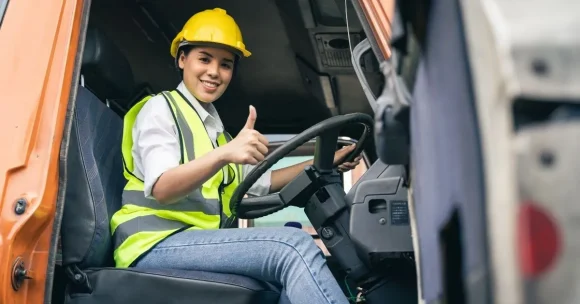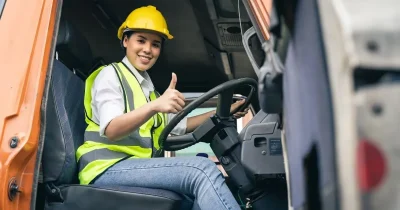The trucking industry faces a persistent challenge: attracting more women. This despite women having been confirmed as safer drivers, statistically.
Innovative Logistics University says diversification is “becoming increasingly essential” as businesses realize the need to stay competitive and meet the changing needs of customers.
“A diverse workforce can provide different perspectives and ideas for your business. Consider recruiting from non-traditional sources, such as veterans or women, to bring in fresh talent and perspectives,” the university said in an article.
Women in trucking: Gender gap revealed
According to the American Transportation Research Institute (ATRI), women make up only 8.1% of all truck drivers in the United States. In addition, they account for only 2.7% of the nation’s long haul-truck drivers.
ATRI senior vice president Dan Murray says there is a “huge opportunity in terms of the number of women we could potentially get.” He adds: “At the end of the day, we’ll have fewer crashes and lower insurance costs.” He calls on trucking companies to be “more aggressive in attracting women to the industry.”
Gender bias and harassment
Unfortunately, gender bias and harassment are rife in the industry. Extensive research conducted by Women In Trucking (WIT) among hundreds of professional drivers found that “a significant amount of work [is] yet to be done” in addressing harassment.
This despite the steps taken to reduce sexual harassment or gender bias in the workplace, by means of policies, training and sensitivity programs.
In fact, the WIT says: “Approximately 30% of drivers participating in the study were either unaware of their company’s harassment policies or stated their employer did not have them in place.
More than 55% of respondents said the trucking industry is “safe for women to be employed in,” while 18% disagreed with that statement. The report explains: “A concerning number of respondents reported experiencing harassment and knowing of others who experienced harassment while on the job.”
“Nearly 70% of respondents reported that someone had said something verbally offensive to them while on the job. Approximately 49% reported being verbally threatened at least once, while approximately 57% reported receiving unwanted physical advances while working.”
Case study: Boyle Transportation
One of the companies getting it right is Boyle Transportation. In 2021, WIT recognized Boyle Transportation as a ‘Top Company for Women to Work for in Transportation.’
Laura Duryea, the company’s director of recruiting, retention and professional driver development, says currently, women constitute approximately 40% of its drivers. This in an industry where the average is less than 10%.
Duryea has recently been appointed to the US Department of Transportation’s (DOT) Federal Motor Carrier Safety Administration’s (FMCSA) advisory board for Women in Trucking. The board oversees the recruitment, retention and support of professional women drivers.
According to Duryea, Boyle Transportation has a culture that “appreciates female input. When honest input is received, companies can use that to support women and “provide an environment for them to feel safe and supported as professional drivers.”
The success at Boyle is largely due to the company being “open to having discussions with women about what they need.” In doing so, it provides a culture of inclusion.
The bigger picture
More effort is needed to bridge the gender gap in trucking, especially since the data shows that having a more diverse workforce offers a unique set of benefits – from improved safety records and lower insurance cost to fresh perspectives.
To bridge the gap, the industry must acknowledge the challenges women face. There is light at the end of the tunnel – in the form of companies like Boyle Transportation.
This company demonstrates how vital it is to foster an inclusive culture. Their success underlines the importance of listening to and addressing women’s needs when it comes to safety.
About the author
Cheryl has contributed to various international publications, with a fervor for data and technology. She explores the intersection of emerging tech trends with logistics, focusing on how digital innovations are reshaping industries on a global scale. When she's not dissecting the latest developments in AI-driven innovation and digital solutions, Cheryl can be found gaming, kickboxing, or navigating the novel niches of consumer gadgetry.











